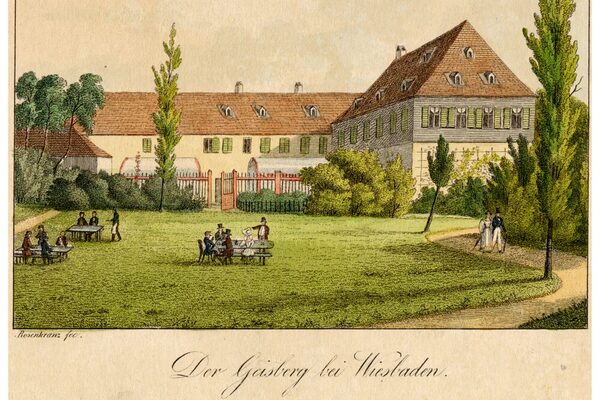Geisberg
In 1788, the Nassau government president Karl Friedrich Freiherr von Kruse had the Geisberg estate built with 50 acres of meadows, a group of half-timbered houses and an inn, for which he applied for a liquor license in 1794. Kruse sold the estate to Prince Karl Wilhelm zu Nassau in 1796, who sold it to his cellar inspector and district commissioner Friedrich Reinhard Köpp. In 1811, the Geisberg passed to J. Arnold Ackermann and in 1817 to C. Töse. The Geisberg was a popular excursion destination, which Wiesbaden's spa guests could reach from today's Kureck "high on donkeys" - led by a "donkey major" - e.g. to "shoot for the target". In 1828, the Geisberg was said to be a more popular excursion destination than Sonnenberg, for example. Here you could find different types of Rhine wine, all kinds of cold dishes and dance music in the restaurant hall on Sundays and twice a week. The view and the large garden were famous. In 1814 and 1815, Goethe is said to have stopped here around 14 times during his visits to Wiesbaden; his statement: "In Wiesbaden, you only need a quarter of an hour's climb to see all the glory of the world" is said to refer to the Geisberg. In 1834, the Geisberg became the site of the Hof Geisberg agricultural school; the inn business came to an end. Instead, around 1843, the "Neuer Geisberg" excursion restaurant was built south of Königstuhlstraße.
The agricultural school moved to Mainzer Straße in 1924/25 due to lack of space. The Evangelical Association for Inner Mission in Nassau then acquired the Geisberg estate as a second location for the "Evangelical Rescue Home" for neglected children, which was founded in 1853 near Leberberg to the east of Idsteiner Straße. The funds for the purchase were donated by the Worthmann-Weil families from Wiesbaden. The originally residential special school was gradually converted into a pure day care facility in the 1980s. Since 1997, the school has been recognized by the state as a "comprehensive support and counselling center". It currently looks after around 380 children and young people. The Wortmann-Weil-Stift with two residential groups for children and young people is located in the immediate vicinity. The school and the foundation are part of EVIM's "Child and Youth Welfare".
Literature
Love never ends. 150 years of the Evangelical Association for Inner Mission in Nassau (EVIM). Edited by Pfeiffer, Wilfried, Wiesbaden 2000.
Struck, Wolf-Heino: Wiesbaden as the state capital of Nassau. Part I: Wiesbaden in the Goethe era (1803-1818), Wiesbaden 1979 (Geschichte der Stadt Wiesbaden Bd. 4).
Wagner, Georg: 150 Jahre Landwirtschaftsschule Hof Geisberg in Wiesbaden, Wiesbaden 1968.
